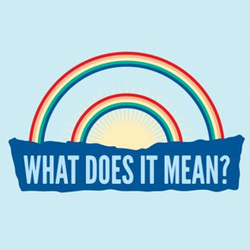
Reading Chapter 4 of Language in Thought And Action by S.I Hawakaya, I learned how humans give each other clues that help each other figure out the meanings of the words we say. First, I was explained the process of creating a dictionary. I always thought the dictionary's definition was something reliable and held authority but it really doesn't. You see words in dictionaries are defined by a bunch of historians using context clues. CONTEXT CLUES! There is no possible way of knowing the exact meaning of a word just by using context clues to define them so dictionaries are only meant to be like a guide tour during a hike. They only guide you to what the meaning of the word have been in the past.
Ever talked to a person that uses big words all the time that no one knows? Well, I have a big tool you can use to survive that situation. According to Hawayaka, Humans find the meaning of a word just by listening to the verbal conversation, this is known as using the Verbal Context. Let's see this example:
Ted: "Hey John?"
John: "Yeah."
Ted: "Can you pass me that shoopla?" (pointing at a book.)
John: (hands him the book)
In this conversation, you can see Ted used a never before seen word, "shoopla." John was forced to use the verbal context of the conversation to find what was it that Ted was asking for. John concluded he must of been asking for the book since he pointed at "that shoopla" and considered the specific situations of the conversation. Using the specific conditions of when a word is used and taking account the physical body language to find the meaning of a unknown word is known as using the Physical and Social Context. Therefore, we learn the meaning of words not from dictionaries but from our experiences and reasoning.
There are two kinds of meaning to a verbal expression:
The Extensional Meaning of a verbal expression is that to which it points to in the Enxtensional (Physical) World or the actual physical thing.
- In the example it was the pointing of Ted to the book.
The Intensional Meaning of a word or expression is that which is suggested inside one's head, or connoted belonging to the Intensional ( The-I-Think-This-Is World).
- In the example it was John reasoning Ted must be talking about a book, since Ted did not directly said that book with words.
Here's an easy way to remember the difference between the two. If you can put your hand over your mouth and point at whatever you are ask to find meaning of, the that word has an extensional meaning.
So, The "One Word, One Meaning" Fallacy is prooved wrong by the fact the meaning of a word is based on the totality of its contexts and contexts are never the same twice, hence, a word never has the same meaning twice.
Is not crazy to realize that when we speak we do this subconsciously? Then human mind is amazing.
Jose.
Ever talked to a person that uses big words all the time that no one knows? Well, I have a big tool you can use to survive that situation. According to Hawayaka, Humans find the meaning of a word just by listening to the verbal conversation, this is known as using the Verbal Context. Let's see this example:
Ted: "Hey John?"
John: "Yeah."
Ted: "Can you pass me that shoopla?" (pointing at a book.)
John: (hands him the book)
In this conversation, you can see Ted used a never before seen word, "shoopla." John was forced to use the verbal context of the conversation to find what was it that Ted was asking for. John concluded he must of been asking for the book since he pointed at "that shoopla" and considered the specific situations of the conversation. Using the specific conditions of when a word is used and taking account the physical body language to find the meaning of a unknown word is known as using the Physical and Social Context. Therefore, we learn the meaning of words not from dictionaries but from our experiences and reasoning.
There are two kinds of meaning to a verbal expression:
The Extensional Meaning of a verbal expression is that to which it points to in the Enxtensional (Physical) World or the actual physical thing.
- In the example it was the pointing of Ted to the book.
The Intensional Meaning of a word or expression is that which is suggested inside one's head, or connoted belonging to the Intensional ( The-I-Think-This-Is World).
- In the example it was John reasoning Ted must be talking about a book, since Ted did not directly said that book with words.
Here's an easy way to remember the difference between the two. If you can put your hand over your mouth and point at whatever you are ask to find meaning of, the that word has an extensional meaning.
So, The "One Word, One Meaning" Fallacy is prooved wrong by the fact the meaning of a word is based on the totality of its contexts and contexts are never the same twice, hence, a word never has the same meaning twice.
Is not crazy to realize that when we speak we do this subconsciously? Then human mind is amazing.
Jose.
 RSS Feed
RSS Feed